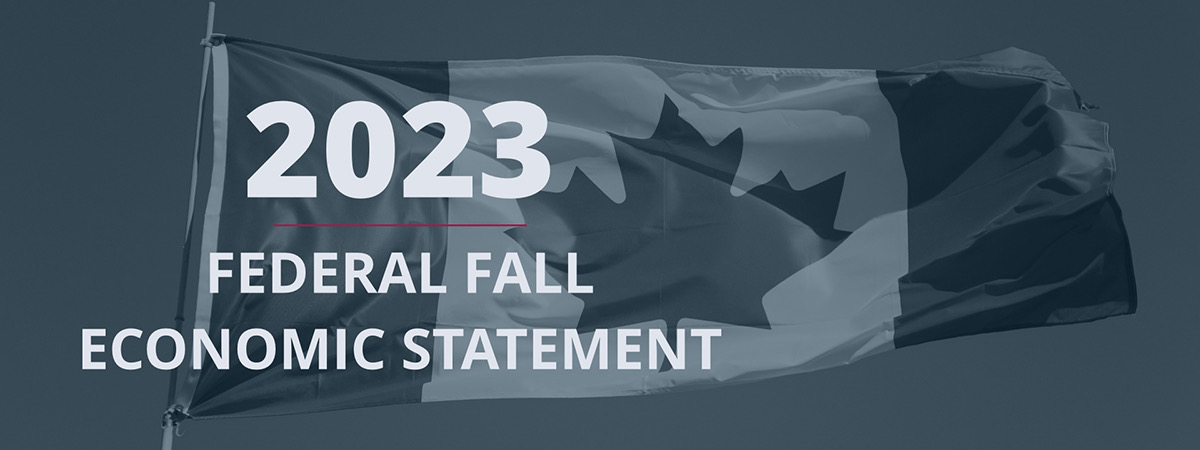On November 21, 2023, Canada’s Finance Minister unveiled the 2023 Federal Fall Economic Statement. The statement expects inflation rates to decrease and subdued economic growth over 2024. For 2023–24, the government is projecting a deficit of $40.1 billion. Over the medium term, the government is forecasting deficits of $35.0 billion in 2024–25 and $26.8 billion in 2025–26. Over the longer-term, the budget deficit is forecasts are $15.8 billion in 2026–27 and $14.0 billion in 2027–28. No major tax changes were announced however notable announcements from the economic statement are discussed below. For complete details, please visit the Government of Canada website.
Underused Housing Tax
The economic statement indicates the Federal government’s proposal to change the implementation of the Underused Housing Tax (UHT) to ease compliance while maintaining the intent of the program. The proposed changes include recharacterizing specified Canadian corporations, partners of specified Canadian partnerships and trustees of specified Canadian trusts as “excluded owners” for purposes of the UHT. Thereby removing their requirement to file annual UHT returns. This is a welcoming change to eliminate the compliance burdenThis proposed change would apply for the 2023 and subsequent tax years. As a result, 2022 tax year filings are still required for entities that were not exempt from filing under the old rules. Finance has also proposed to reduce failure to file penalties to $1,000 for individuals and $2,000 for corporations, per failure. The reduced penalties apply to the 2022 and subsequent tax years. This was previously $5,000 and $10,000 respectively. The government also provided clarification regarding ‘condominiumized’ apartment buildings, stating that they are not residential property for UHT purposes. This proposed measure is also effective for the 2022 and subsequent tax years. The FES also proposed a technical amendment that limits the vacation property exemption to one residential property for a calendar year per individual/spousal unit. Furthermore, Finance is proposing a new UHT exemption for residential properties held as a place of residence or lodging for employees in certain areas.
Joint Venture Election
The government has initiated a consultation period ending in 2024, which seeks comments on proposed new rules for Goods and Services Tax/Harmonized Sales Tax (GST/HST) joint venture elections aimed at simplifying access to the benefits the election offers. One proposed change is the requirement for mandatory filing, in prescribed form, of the joint venture election forms including the details of the election and effective date. New legislation would also require all electing participants to be registered for GST/HST purposes in filing the election. Other notable changes include an all or substantially all commercial activities condition and revisions to current deeming measures.
Supporting Employee Ownership Trusts
Finance is also introducing measures to incentivize sales of business to Employee Ownership Trusts (EOT) first introduced in Budget 2023. Proposed is the exemption from tax for the first $10 million in capital gains realized on sale of a business to an EOT. The newly announced incentive would be effective for the 2024 through 2026 taxation years. The government will be releasing further details, including the specific conditions which will be required to be met to qualify for the incentive.
Removing the GST/HST from Psychotherapy and Counselling
In an effort to improve access to support services offered by psychotherapists and counselling therapists for Canadians, the government is proposing to exempt these services from the GST/HST. This measure would be effective as of the date the legislation receives royal assent.
Short Term Rentals
As discussed in our New Housing and Construction publication, the federal government is cracking down on short-term rentals that are keeping homes off the market. Finance proposes to deny deductions for short term rentals in provinces or municipalities that have prohibited short-term rentals. This includes interest expenses, property taxes, etc. The government intends to deny income tax deductions when short-term rental operators are deemed non-compliant with the applicable governing bodies licensing, permitting, and registration requirements. This measure relates to all expenses incurred on or after January 1, 2024.
Co-Op Rental Housing
The FES proposes to eliminate GST/HST on co-operative housing corporations that provide long term rental accommodation. This measure only applies to new supply and will not apply to substantial renovations of existing residential complexes. The federal government is encouraging all provinces to remove sales taxes to rental housing construction.
Tax Credits
Clean Hydrogen, Technology and Electricity Investment Tax Credits
Introduced in Budget 2023 were investment tax credits focused on promoting investment in environmentally friendly technologies and production equipment. The 2023 Economic Statement provides further clarifications and updates to these new credit programs. Notably including eligible clean ammonia production equipment, power purchase agreements and acquisition of property for electricity and heat generation from waste biomass.
Canadian Journalism Labour Tax Credit
Introduced in Budget 2019, the credit provides a 25 percent refundable tax credit on salary or wages paid to eligible employees of a qualifying journalism organization to a limit of $55,000 of eligible wages per taxation year. The 2023 Economic Statement proposes to increase the tax credit rate to 35 percent for a period of 4 years in addition to increase the annual wage expenditure limit cap to $85,000. The changes being made effective for expenditures incurred from January 1, 2023 onward.
Previously Announced Measures
Within the Fall Economic Statement, the government confirmed their intention to proceed with previously announced tax measures being made effective January 1, 2024. Notably included are revisions to Alternative Minimum Tax for high-income individuals and application of the General Anti-Avoidance Rule among others. An inclusive list being available with the 2023 Federal Fall Economic Statement.
Resources
FES 2023 – Tax Measure Supplementary Information
The information in this article is of a general nature and is in summary form. Contact one of our tax professionals to discuss these matters in the context of your situation before acting upon such information.






